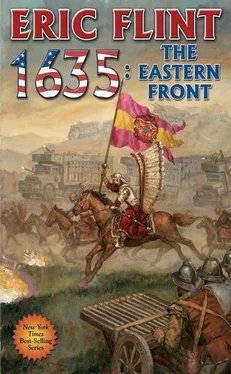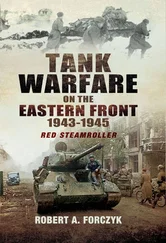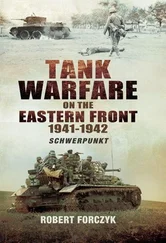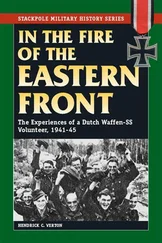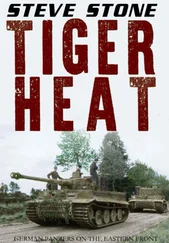Eric Flint - 1635 - The Eastern Front
Здесь есть возможность читать онлайн «Eric Flint - 1635 - The Eastern Front» весь текст электронной книги совершенно бесплатно (целиком полную версию без сокращений). В некоторых случаях можно слушать аудио, скачать через торрент в формате fb2 и присутствует краткое содержание. Жанр: Альтернативная история, на английском языке. Описание произведения, (предисловие) а так же отзывы посетителей доступны на портале библиотеки ЛибКат.
- Название:1635: The Eastern Front
- Автор:
- Жанр:
- Год:неизвестен
- ISBN:нет данных
- Рейтинг книги:5 / 5. Голосов: 1
-
Избранное:Добавить в избранное
- Отзывы:
-
Ваша оценка:
- 100
- 1
- 2
- 3
- 4
- 5
1635: The Eastern Front: краткое содержание, описание и аннотация
Предлагаем к чтению аннотацию, описание, краткое содержание или предисловие (зависит от того, что написал сам автор книги «1635: The Eastern Front»). Если вы не нашли необходимую информацию о книге — напишите в комментариях, мы постараемся отыскать её.
1635: The Eastern Front — читать онлайн бесплатно полную книгу (весь текст) целиком
Ниже представлен текст книги, разбитый по страницам. Система сохранения места последней прочитанной страницы, позволяет с удобством читать онлайн бесплатно книгу «1635: The Eastern Front», без необходимости каждый раз заново искать на чём Вы остановились. Поставьте закладку, и сможете в любой момент перейти на страницу, на которой закончили чтение.
Интервал:
Закладка:
The storm clouds were coming fast. The Poles would start charging furiously now, while the soil was still firm enough that their horses could move across it. The condition of the ground was already bad-terribly so for cannon balls-but it wasn't bad enough that Polish warhorses would disobey their masters. A horse could handle such terrain, even if they didn't like it. They wouldn't be galloping, of course. But even a hussar charge at the speed of a canter could hammer down an opponent if they failed to stand their ground.
That was Gustav Adolf's great concern. Modern infantry could withstand cavalry if they were trained and seasoned, which these troops were-provided they retained their confidence. And there was nothing that would faster erode a unit's morale than the feeling they were alone, isolated, with their commanders nowhere to be seen.
The feeling, in short, that a heavy rain would bring.
The king of Sweden knew exactly what Koniecpolski would do now. The grand hetman would push his hussars to the utmost in order to take advantage of whatever period existed between the arrival of the rain and the subsequent obscuring of the battlefield and the point at which the rain turned the ground so muddy that cavalry were effectively unusable.
The morale of his troops. That was everything, now. He had to do whatever was necessary to keep them from faltering.
Without even realizing he was doing so, Gustav Adolf eased his sword in and out of its scabbard in order to make sure it would come forth easily if he needed it. Then he did the same with his pistols in their saddle holsters.
Anders Jonsson knew how to read the signs. He swiveled in the saddle and gave his little unit of Scotsmen a fierce and commanding look.
You know what's probably coming. Be ready!
Then he faced forward again. Were it not completely inappropriate in the presence of his monarch, Anders would have shouted his sentiments aloud-and been echoed by a dozen Scot throats.
Fuck!
Chapter 37
The first hussar charge was driven back with a horrible slaughter. This was the first time Stanislaw Koniecpolski had faced the new rifled muskets massed on a battlefield, and he'd underestimated their effectiveness. They could be reloaded as quickly as smoothbore muskets but had two or even three times the effective range. He understood now why the Swedes had such a seemingly-perilous dearth of pikemen. They had only one pike for every two muskets, where the usual ratio was one-to-one or even two-to-one in favor of the long spears.
But those slender ranks of pikemen were enough, given the horrific rate of fire being maintained by the riflemen they were protecting.
Koniecpolski almost lost the battle, right then and there. He surely would have, had he followed his natural urge to hurl more hussars at the enemy. He'd won battles before with that simple tactic, and more than one of them. Hussars were terrifying in a full charge, on their immense horses and with the wings expanding their apparent size and their huge lances. They were like something out of legend. Mounted knights of fable, with the ferocity of ancient warriors.
But not this battle. The Swedes stood their ground and gunned down the Polish cavalry. Shot them and shot and shot them. Not more than twenty or thirty even managed to reach the enemy lines, and they were either killed or driven off by the pikes soon enough.
The grand hetman couldn't afford such casualties. Not even hussars could withstand losses like these, if they kept up.
"Call them back!" he bellowed to his aides. As they raced off to carry out his orders, Koniecpolski turned to the commander of his Cossack units, Severyn Skoropadsky.
"I need you to relieve the pressure, Ataman. Make no frontal attacks, you understand. Just harass them and keep them off balance for…"
He paused to gauge the sky. "Perhaps half an hour. Or a bit longer."
Skoropadsky had a little smile on his face, with perhaps a trace of derision. As if Cossacks were dumb enough to imitate blockhead Polish hussars! Cossacks were raiders of the steppes. Like Tatars and the Mongols before them, their style of warfare was fluid. They mostly used firearms now instead of bows, but their tactics were still basically those of mounted archers.
But if there was any derision in that smile, it was only a trace and more the product of Cossack habit than any disrespect for Koniecpolski himself. The grand hetman of Poland and Lithuania was well-regarded by the Commonwealth's registered Cossacks. Koniecpolski had played a major role in the Polish campaign to crush the Cossack rebellion in 1630 led by Taras Fedorovych. No Cossack doubted that Koniecpolski would have completely crushed the rebels had that been what he saw as his duty. But during the negotiations that finally produced a treaty in August, Koniecpolski had opposed harsh reprisals against the Cossack rebels. He'd thought that the long-standing tensions between Poland-Lithuania and the Cossack hosts would never end until the Commonwealth changed its policies toward the Cossacks.
So, whenever he went on campaign, Koniecpolski had no trouble gaining the adherence of several thousand registered Cossacks-no small accomplishment, given that there were not all that many to begin with. Many of them were no doubt unregistered, of course. In time of war, the atamans would usually look the other way if their ranks were partially filled with Cossacks from the various independent hosts who had no legal standing in the Commonwealth.
So would Stanislaw Koniecpolski. Whatever their faults, Cossacks were fighters.
Whenever a charge was broken as badly as this one had been, there was always the great danger that the retreating cavalrymen would trigger panic in the whole army. The repulse of a charge would then become the rout of an army.
Koniecpolski himself could play the most important part in stifling that danger. He was already riding toward the returning hussars, to steady them with words of assurance and his simple presence. But it would help a great deal if the army could see that the enemy was being engaged by other forces. In truth, the Cossacks couldn't do more than tear at the edges of the Swedish forces. But that would be enough to keep Gustav Adolf from launching any charge of his own. All Koniecpolski needed was enough time for the rain to begin again.
Cavalrymen didn't like to fight in a storm, even less than infantrymen did. The horses were harder to handle, and for good reason. Many of them would inevitably stumble, charging through rain and mud, and a horse fall could kill or cripple a man very easily.
Still, whether they liked it or not, hussars would have the advantage in a heavy rain. Their somewhat archaic style of war would serve them in good stead then.
A musket is hard to reload in a downpour, leaving the soldier with no better weapon than a bayonet-against a sixteen-foot lance that needed no reloading. And when that lance was lost as lances usually were in a battle, the infantryman would then have to face the hussar's saber. A man on foot armed with what amounted to a short clumsy spear, against a man wielding a long saber from atop a horse fourteen to sixteen hands tall.
It would be a bloody, muddy, mess of a battle. But Koniecpolski thought he could win it. No, Koniecpolski was determined to win it. This was the third time Gustav Adolf had invaded Poland. Enough was enough.
Given the pace Mike Stearns was demanding, the march had been exhausting already. Then the rain started coming down.
"Well, fuck a duck," said Colonel Jeff Higgins. Wishing, before long, that he was a duck himself.
At the front of the column, Mike and his aides had called another halt. They had no choice, really, since the division was getting spread out too thinly again. There was only one passable road in this area and you could only safely march three men abreast. That meant the Third Division stretched for more than two miles between its head and its tail. If you didn't make periodic stops, that stretch got even worse. The division was like a giant caterpillar moving across the Polish landscape.
Читать дальшеИнтервал:
Закладка:
Похожие книги на «1635: The Eastern Front»
Представляем Вашему вниманию похожие книги на «1635: The Eastern Front» списком для выбора. Мы отобрали схожую по названию и смыслу литературу в надежде предоставить читателям больше вариантов отыскать новые, интересные, ещё непрочитанные произведения.
Обсуждение, отзывы о книге «1635: The Eastern Front» и просто собственные мнения читателей. Оставьте ваши комментарии, напишите, что Вы думаете о произведении, его смысле или главных героях. Укажите что конкретно понравилось, а что нет, и почему Вы так считаете.
